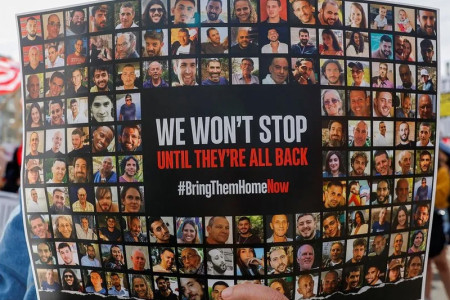The group blamed the deaths on Israeli bombardment and said a "number" of its fighters were also killed. It said the number of hostages killed might now exceed 70.
The BBC has not been able to independently verify this.
It was not immediately clear if these deaths were among the 31 hostages Israel believes have already died.
There has been no comment yet from Israel, and Hamas did not provide substantiating evidence.
Hamas took 253 hostages when gunmen launched an attack on southern Israel on 7 October, and killed about 1,200 people.
Israel responded by launching a large-scale air and ground campaign to destroy Hamas. More than 30,000 Palestinians have been killed in Gaza as a result, the Hamas-run health ministry says, and the UN is warning of a looming famine in the north of the country.
In November, Hamas released 105 hostages as part of a temporary ceasefire deal with Israel, in exchange for Israel freeing 240 Palestinian prisoners. Israel says more than 100 hostages are still being held inside Gaza.
It is not known when the reported deaths of the hostages took place.
In a statement released on the Telegram account of the Qassam Brigades - Hamas' armed wing - spokesman Abu Obeida appeared to suggest that the group was still interested in a deal with Israel to release the hostages in return for prisoners held by Israel.
"We affirm that the price we will take in exchange for five or 10 living prisoners is the same price we would have taken in exchange for all the prisoners if the enemy's bombing operations had not killed them," the spokesman said.
The release of hostages is one of the central points in ceasefire talks in Qatar which have been going on for months.
The discussions are trying to secure a short-term ceasefire, during which hostages would gradually be released. Female civilians and soldiers would be freed first.
In return, Palestinian prisoners, some of them convicted of serious terrorist offences, would be released from Israeli jails.
Israeli soldiers might move away from some of Gaza's most populated areas, and some of the 1.8 million Palestinians displaced by the fighting since October might be able to return to homes in the north.
However, there are fears that the announcement of the hostages' deaths, coupled with the deaths of at least 112 people during a Gaza aid delivery on Thursday, could hamper these talks.
Hamas accused Israel of firing at civilians, but Israel said most died in a crush after it fired warning shots.
After Thursday's deaths, Hamas warned that talks in Qatar to try and secure a new ceasefire alongside the release of Israeli hostages it is holding could now be jeopardised.
Earlier this week, US President Joe Biden had said he hoped a temporary ceasefire could be agreed by early next week but this is looking increasingly unlikely.
On Friday, Mr Biden announced that "in the coming days" the US would take part in air drops of food into Gaza.
"Innocent people got caught in a terrible war, unable to feed their families. And you saw the response when they tried to get aid," he said.
"We need to do more and the United States will do more."
The US announcement comes one day after Jordanian air force pilots dropped 33 tonnes of medical supplies and food into Gaza.
According to the Washington Post, Jordanian planes have also dropped aid provided by the US and the UK, while planes from France, Egypt and the United Arab Emirates have participated in similar operations.
Air drops have been criticised by aid groups as costly and insufficient.
"Oxfam does not support US air drops to Gaza, which would mostly serve to relieve the guilty consciences of senior US officials whose policies are contributing to the ongoing atrocities and risk of famine in Gaza," the charity group said.
"While Palestinians in Gaza have been pushed to the absolute brink, dropping a paltry, symbolic amount of aid into Gaza with no plan for its safe distribution would not help and be deeply degrading to Palestinians," Oxfam said.
It added that the US should instead work to "cut the flow of weapons to Israel".
On Friday, Nicaragua filed a case at the International Court of Justice, calling on it to stop Germany from giving military aid to Israel. Together with the US, Berlin is one of the largest arms exporters to Israel.
By Alex Binley
BBC News


